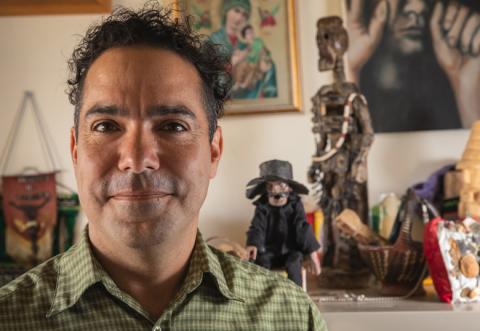From 19th century white explorers to 21st century New Age seekers, interest in Maya culture has rarely ebbed
On Thursday, February 25, University of Lethbridge anthropology professor, Dr. James (Jamie) MacKenzie, will present, Being Maya: Reflections on Ethnicity, Religion and Place. This is the fifth talk of the 2020/21 season for the Faculty of Arts & Science’s PUBlic Professor Series. The free event is open to the public and will be broadcast Live on Zoom, starting at 7 p.m.
What comes to mind for most when they hear the word “Maya” are images of abandoned temples, soaring from rainforest canopies. The inevitable question follows: “Where did they all go?”
The short answer, of course, is nowhere. The Maya (as classified by scholars at least) are among the most populous indigenous peoples of the Americas, with some six million living in and around Guatemala and Southern Mexico (not to mention hundreds of thousands who have migrated to the United States in recent years). It is more interesting, if less dramatic, to reframe the question to ask what a Maya identity means to the people concerned.
In this talk, MacKenzie reflects upon what he has learned from contemporary indigenous Guatemalans — many of whom now identify in some way as Maya — since the mid-1990s, when he began researching religion and ethnicity in their country and beyond.
His work has focussed on issues of religion, politics and ethnic identity, and the way that broad national and global institutions, movements and ideologies intersect with and are transformed by local attachments and experiences. He has been interested in the way plural religious and ethnic landscapes are managed at local levels and beyond.
Mackenzie has worked at the University of Lethbridge since 2005, where he has taught courses relating to the anthropology of religion and ritual, as well as ethnographic methods, linguistic anthropology, the cultures of Mesoamerica, popular culture, and a range of advanced seminars treating themes ranging from migration to anarchism.
MacKenzie has published his research in a wide range of academic journals and is the author of a well-reviewed book, Indigenous Bodies, Maya Minds: Religion and Modernity in a Transnational K’iche’ Community.
-- 30 --
Contact:
Dr. James MacKenzie, Department of Anthropology
403-329-2599
james.mackenzie@uleth.ca
Catharine Reader, Office of the Dean, Faculty of Arts & Science
403-382-7154
catharine.reader@uleth.ca
